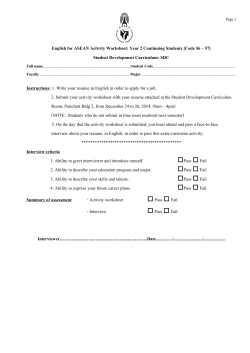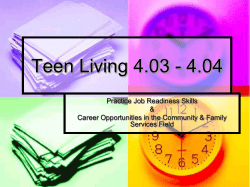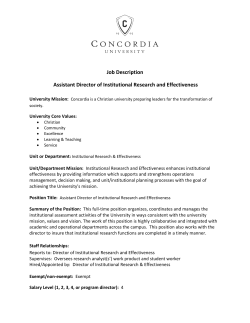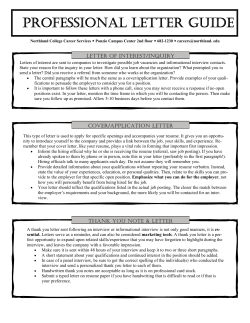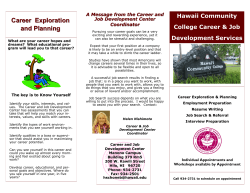
The Education Major`s Job Search Guide
The Education Major’s Job Search Guide Concordia College Career Center Parke 248 | 218-299-3020 career@cord.edu | www.ConcordiaCareerCenter.com The Education Major’s Job Search Guide Career Fair Opportunities for Education Majors – 2015 MN Education Job Fair - Minneapolis Convention Center April 13, 2015 Register today, visit Career Center website for details. Info: www.mnedfair.org Tri-College Education Fair – MSUM, Moorhead, MN April 27, 2015 - 4:00-6:00 - Check Career Center website for details. Check out Career Center workshops in CareerLink, they are designed to help you prepare. Registration requested, but not required: www.ConcordiaCareerCenter.com Job Posting Sites for Education Majors While there are several job posting sites for jobs in education, here are a few favorites to get you started: • CareerLink – accessed from the Career Center webpage (upper right corner), using your Concordia login. • EdPost - http://www1.stcloudstate.edu/joblistings/edpost/ (hosted by St. Cloud State University) • Minnesota Association of School Administrators - www.mnasa.org • K12 Job Spot - http://k12jobspot.com • Teachers-Teachers.com - http://www.teachers-teachers.com Create a Self-Managed Credential File Education majors are encouraged to create and maintain a credential file with materials most commonly requested by employers. Suggested materials for the file include: • A reference list and letters of recommendation from your supervising teacher, selected faculty and other employers or campus personnel who know you well. • Copies of your transcript. • Copies of your teaching license (or letter from the Registrar’s office stating application is underway) • Your resume and cover letter drafts • Your test score results Steps to Obtaining Minnesota Licensure After completing all requirements of graduation and passing required MTLE tests, submit your licensure application online (a 30 minute process) at the Minnesota Department of Education website, http://education.state.mn.us/mde. Application information can be found on the “Educator Excellence” tab. Click on “Licensing” and scroll to the middle of the page to find the section “Apply for a New Teacher License”. On the right side of the screen, click on “Online Licensing System”. Create an account and begin the application process, carefully following instructions. You have 30 minutes to complete your online application. If you do not submit your application within the 30 minute time period, your session will close and the information will not be saved. Have your credit card ready for payment of application fee and fee for Bureau of Criminal Apprehension. Print out the application COVER SHEET and download and print the Verification form for Concordia College. Submit the cover sheet along with the Verification for Concordia College and completed fingerprint card (available at the Concordia College Career Center in Academy Hall or can be requested at the Minnesota Department of Education website) to Diane Holmquist in the Concordia College Registrar's Office in Lorentzen Hall (218- 299-3250). The online application is only effective for 60 days. It is very important that you have met all requirements before applying for licensure or you will lose the application fee and need to start the process over. ** Search the US Department of Education’s website to learn about teaching licensure in other states: www.ed.gov or use Certification Map for another quick reference: http://certificationmap.com Revised: 2/14 Resume Guide for Education Majors NAME It is generally best to use your entire first name and middle initial. Your name should stand out so use boldface, capitalization, a larger font size, etc. ADDRESS Put your complete address and phone number (indicate if it is a cell phone) at the top of the resume. If you have two addresses, you may want to include both (current and permanent). Plan to include an appropriate email address and check it regularly. BRANDING STATEMENT (OPTIONAL) You may isolate a statement that captures your ability to be an effective educator from a letter of recommendation from your cooperating teacher, professor, or college supervisor. Put it under the heading and above the objective, using italics, bolding or other font to make it stand out. Include the name and title of the recommender. OBJECTIVE (OPTIONAL) You will need to tailor your objective on each resume to fit the description of the job for which you are applying. LICENSURE List areas/grade level you will be certified to teach after graduation (i.e., Elementary Education (K-6), English (7-12), plus other endorsements such as Coaching). Use the specific language used but the certification office of the state. EDUCATION Include your degree (B.A. or B.M. are the only options at Concordia), month and year of graduation, the institution (in this case, Concordia College) and its location, and major area(s) of study. If your GPA is 3.00 or higher, it’s to your advantage to include it. You can contact the Registrar’s Office to obtain your current GPA. If your major GPA is significantly higher than your overall GPA, you may want to include it instead. If you do, it should be labeled as your major GPA. HONORS List scholarships, awards, and honors in athletics, music, drama, scouting, etc., as well as scholastic and community awards. TEACHING EXPERIENCE Include student teaching and, if you have room, pre-student teaching clinical experience(s). Include details such as when, where, and what grade levels and/or subjects you taught. Specify which instructional strategies or modalities were utilized and, where appropriate, modifying for IEPs. Include terminology such as service learning, cooperative learning, whole language, inclusion, multicultural education, or other current trends in the discipline which you either used or observed. (In some cases, these "buzz words” might be best included in items under SPECIAL SKILLS. You can tailor your resume to fit your own circumstances.) RELATED EXPERIENCE List either jobs or volunteer experiences which are teaching-related or youth-related (i.e., YMCA Camp Counselor, Swimming Instructor, Little League Coach, and Reading Tutor.) SPECIAL SKILLS List specific strengths or areas of expertise such as knowledge of computers, strong science background, ability to work with the disruptive child, physically and/or mentally challenged students, etc. Try to personalize your resume so that it reflects your unique experience and abilities – not those of someone else. ACTIVITIES List college, church, and community activities and organizations, emphasizing leadership roles. Include student professional organizations. High School activities may also be listed, especially if they could be helpful in getting you the job, and even more so if you are seeking a job in secondary education. (If you were involved in the yearbook, include it! They may need a yearbook advisor! Think similarly for other activities.) REFERENCES (Optional) Names, addresses, email, and phone numbers of references may be listed on an additional page or on the second page of a resume if at least two-thirds of the page contains quality information. Avoid writing “Available upon request”. 3 On your resume, POWER VERBS demonstrate . . . Leadership, Decision-Making, and Management Skills Allocated Governed Operated Selected Determined Hired Oversaw Sponsored Directed Initiated Pioneered Staged Elected Inspired Presided Started Enlisted Led Produced Supervised Formed Managed Recruited Founded Motivated Represented Apprised Educated Lectured Taught Answered Explained Listened Trained Briefed Familiarized Presented Translated Conducted Handled Reported Wrote Contacted Informed Responded Demonstrated Instructed Spoke Dissuaded Publicized Encouraged Resolved Marketed Sold Mediated Secured Negotiated Solicited Composed Revolutionized Designed Conceptualized Established Invented Audited Evaluated Searched Compiled Examined Surveyed Consulted Gathered Tested Detected Identified Discovered Interpreted Assisted Guided Treated Collaborated Helped Contributed Mentored Counseled Provided Comforted Settled Collected Executed Prepared Centralized Formalized Processed Coordinated Implemented Routed Catalogued Installed Recorded Distributed Maintained Reorganized Augmented Decreased Expedited Launched Revamped Awarded Developed Fabricated Mastered Revitalized Boosted Ensured Financed Modernized Saved Broadened Eliminated Gained Published Strengthened Built Exceeded Generated Raised Utilized Communication Skills Acquainted Drafted Introduced Summarized Ability to Sell or Convince Arbitrated Persuaded Convinced Promoted Ability to Create or Innovate Authored Originated Created Devised Analytical or Research Skills Analyzed Documented Interviewed Assessed Edited Researched Counseling, Helping, or Mediating Skills Aided Facilitated Supported Attended Fostered Tutored Administrative, Organizational, and Follow- Through Skills Arranged Disseminated Organized Scheduled Assembled Enforced Planned Updated More Useful Power Verbs Adopted Calculated Excelled Improved Reconciled Attained Catered Expanded Increased Reduced Effectively Describing Your Experiences 4 Knowing how to describe your teaching experiences in educational terms on your resume is a key to securing an interview. Below you will find some very helpful information taken from The Job Hunter’s Word Finder by James Bluemond that will help you write a resume that will get results. Another outstanding resource is O*Net, an online resource at the Career Center website. Teacher SKILLS • Instill a sense of worth in students • Curriculum development and enrichment • Cooperative learning strategies • Integrated lessons • Motivation techniques • Child-centered classrooms • Probabilistic thinking • Team-teaching • Thematic approaches • Multi-ability children • Team building and goal setting • Outcome-based education theory • Self-contained classrooms • Peer tutoring systems • Behavioral disorder and emotionally disturbed children • Whole-group instruction • Critical Elements of Instruction (CEI) • English Language Learners • Inclusion and integration processes • Metalinguistics • Full-curriculum classrooms • Student counseling • Youth empowerment • Performance-based accreditation • Problem-based curriculums • Accelerated modes of delivery in educational settings RESPONSIBILITIES • Establish a non-threatening environment that encourages creative expression • Provide student guidance • Develop activities for classroom functions • Monitor student progress • Enforce assertive discipline techniques • Create grade-appropriate material • Devise and implement a curriculum emphasizing the emotional, social, and intellectual development of children • Participate in staff development • Foster a problem-solving environment • Develop teaching modules • Communicate with parents, teachers, counselors, administrators • Collaborative consultation • Encourage parent involvement ATTRIBUTES • • • • Realize the difference between being taught and being educated Ability to motivate children and help them surpass their expectations Viewed as a consultant by other faculty Culturally aware Sample Resume Ed U. Cate 5 CPO 5555, 901 8th St. S. | Moorhead, MN 56562 | Cell: (555) 555-5555 | Email: student@cord.edu “Ed demonstrates an enthusiasm for teaching and a command of mathematic principles.” Jane Doe, Cooperating Teacher OBJECTIVE To obtain a secondary math teaching position at Awesome High School LICENSURE • Minnesota Teaching Licensure, Secondary Math (7-12), Anticipated June 2012 EDUCATION Bachelor of Arts Concordia College Major: Mathematics Education • Honors: Excellence Scholarship, 2010 – 2014; Dean’s List, 3 semesters • Study Abroad: Mathematics in Another Light, Europe and Egypt, May 2013 TEACHING EXPERIENCE Moorhead High School Student Teacher • Taught Readiness Algebra and Algebra 1 in a block format • Modified curriculum to meet the needs of students on IEP, Section 504, and English Language Learners • Created an open and safe classroom environment and practiced classroom management • Assessed student progress using project and standard based assessment May 2015 Moorhead, MN GPA: 3.XX/4.00 Moorhead, MN Spring 2015 Education Clinical Experiences • 7th Grade - Ben Carl Eielson Middle School, Moorhead, MN, Fall 2013 • 8th Grade - Discovery Middle School, Fargo, ND, Spring 2013 • ELL - Moorhead High School, Moorhead, MN, Fall 2012 RELATED EXPERIENCE Concordia College, Math Department Grader - Pre-Calculus and Math 105 Liberal Arts Mathematics • Evaluate and record students’ homework and quizzes • Responsible for prompt return and organization of students’ work and grades Concordia College, Math Department Math Tutor • Established an open environment for student’s to ask questions and eliminate misunderstandings • Guided individual thinking and collaborative group work Moorhead, MN Fall 2012-Present Moorhead, MN Spring 2012 Concordia College – Residence Life Moorhead, MN Resident Assistant 2010-2012 • Provided sense of community and support and facilitated social activities and learning opportunities for residents • Encouraged academic success and involvement in college activities • Mediated disagreements between roommates and enforced rules INVOLVMENT • Professional Affiliations: National Council for Teachers of Mathematics, 2 years; Minnesota Council of Teachers of Mathematics, 1 year; National Education Association, 1 year • Leadership: Math Club, LeadNow Personal Perspectives • High School Involvement: Key Club President, Jazz Band Cover Letter Recipe Ed U. Cate CPO 5555, 901 8th St. S. | Moorhead, MN 56562 Cell: (555) 555-5555 | Email: student@cord.edu Date Employer Name, Title (It is critical to address your letter to the appropriate person.) School Name Address City, State, Zip Dear Ms./Mr./Dr. Prospective Employer : (if unknown – “To Whom It May Concern”) Opening Paragraph: Your opening paragraph should be creative and catch the employer’s attention. Indicate how you learned about the position and if you have a direct reference point with the employer. State why you are specifically interested in the district and the position for which you are applying. Demonstrate your knowledge of the district and the community – show them that you have done your homework! AVOID beginning this paragraph with the word “I”. Middle Paragraph(s): This is the most important paragraph of the letter. Stress what you can contribute to the organization. Highlight education, your particular experiences and abilities (not just responsibilities) that relate to the position for which you are applying. How do you uniquely meet the needs of the employer? Do not simply repeat the information already outlined in your resume but rather make a compelling case for you as a candidate. Closing Paragraph: This paragraph should serve as a closing of the letter, a call to action (i.e. a request for an interview), and a “thank you” to the employer. Inform the employer of any of the following if they apply to your situation: you will be in the area on a certain date or if you will be away for an extended period of time and you will need to be contacted at a different location (always make it easy for an employer to contact you). If appropriate, request any necessary application materials from the employer. Complimentary Closing (Sincerely, Sincerely yours, etc.) (3-4 spaces) Signature Your Name typed Enclosure: (Number of items enclosed or name the items excluding the cover letter) A Word About References . . . . § § § § § 3-5 reference providers are suggested. List only references who have given you their permission. Those involved as student teaching supervisors will be writing an evaluation which can serve as a written reference. These evaluations should automatically be forwarded to the Career Center by the Education Department. When requesting letters of reference beyond your student teaching supervisors, provide some guidance as to what areas you wish the writer to address. It is your responsibility to make sure your letters of reference have been written and received by the Career Center. 7 § Allow up to 4 weeks for your non-student teaching references. Keep your references up-to-date about your job search. Let them know when you are interviewing for a specific position. Send them a copy of the job ad and brief information about the school along with your resume for their reference. Create a separate reference list on Word: § Choose a format and font that complements or matches your resume. § Create a heading that matches your resume. § In list form, include the reference’s name, job title or relationship to you, address, phone number(s), and email address. § Use 1” or 1.5” margins. Allow at least two or three spaces between reference information. Ed U. Cate Academy 101, 901 8th Street S | Moorhead, MN 56562 | PH: 218-299-3020 | EMAIL: ecate@cord.edu REFERENCES Ima Cobber, Ph. D. Assistant Professor, Education Concordia College th 901 8 Street South Moorhead, MN 56562 Phone: 218-299-3299 Email: cobber@cord.edu Right Angle, Ph. D. Assistant Professor, Mathematics Concordia College th 901 8 Street South Moorhead, MN 56562 Phone: 218-299-5555 Email: angle@cord.edu Spud Bud, Math Teacher Moorhead High School 1475 Education Way Moorhead, MN 56560 Phone: 218-555-5555 Email: spud@moorhead.k12.mn.us Home Sweethome, Hall Director Concordia College th 901 8 Street South Moorhead, MN 56562 Phone: 218-299-3299 Email: sweethome@cord.edu Phone: 218-356-5555 Education Interviews: Convincing the District that YOU are the Right Candidate DO YOUR HOMEWORK If you come to an interview thinking that you can just wing it and don’t have to prepare, you are mistaken. The interviewer will be able to tell. In order to market yourself effectively, you need to do your homework – both about yourself and the school districts you are considering. Self Assessment: Identifying your own strengths and weaknesses is the first step in interview preparation. Make a list of things 8 you do well and things that you need to work on. Become efficient at describing yourself in a positive and confident manner, describing your skills in terms familiar to employers (dependability, quick learner, competent, enthusiastic, dedicated…). Be sure you can think of real life examples to relay these qualities. Employers recognize that beginning employees still have much to learn. They will appreciate your honest and articulate responses. Research Potential Employers: Learn as much about the school district and the community as possible. After all, how are you going to interview well if you don’t know the district’s priorities, goals and expectations? When requesting a teaching application, ask for information about the district. Study the school district web site. It will be a great source of up-to-date information. Local Chambers of Commerce are another excellent resource for gathering information about schools and their communities. DRESS PROFESSIONALLY First impressions can make or break an interview! • Your clothing – Dress conservatively! A good guideline is to dress as you would for an important day at school. Wear clothes that look professional and are comfortable…you want to be able to concentrate on the interview and not on your appearance. • Your shoes – Professional, clean, shined and comfortable! • Your accessories – Nothing that jangles, shimmers, or attracts more attention than you (including your make-up) Little or no fragrance. BE PUNCTUAL Arrive on time or early, and know where you are supposed to be. Before the day of the interview, you should find out exactly where to go and figure out how long it will take you to get there—taking traffic and other delays into consideration. When you arrive on site, introduce yourself to the receptionist and explain why you are there. Always be courteous to the office staff because they are often asked for their impressions of candidates. You don’t want to damage your chances because you were rude to the secretary. REMEMBER THE CRITICAL FOUR 1. Smile (be FRIENDLY and SINCERE) 2. Maintain a comfortable level of eye contact 3. “Hi, I’m ________, it’s a pleasure to meet you!” (Be confident, but not overbearing) 4. Offer a firm, but not crushing hand shakes. (No limp or bone-breaker hand shakes) DURING THE INTERVIEW… The interviewer will control the direction of the interview, but you need to control your body language and answers. Because interviews tend to be subjective in nature, your enthusiasm, self-confidence, and believability will all affect the outcome. You can only make one first impression – and your non-verbal communication speaks at least as loudly as your words do. Do Not Do Chew gum Be POSITIVE! Interrupt the interviewer Be personable Look at your watch Respond to questions with supporting examples Say anything negative about past employers. Ask questions AFTER THE INTERVIEW Proper follow-up is critical to this process! Within 24 hours of the interview, write and send or email a thank you letter to the interviewer. This is your opportunity to reiterate your interest in the position and to express your thanks for the opportunity to interview. This is a step that may give you an edge over other candidates. Questions to Expect During an Education Interview Sample Traditional Interview Questions • • • • Why did you decide to go into teaching and education? What is one idea/program that you want to implement in your first classroom? How do you individualize your teaching? Tell me about the key components of classroom management? How do you plan to or have you used these in a 9 classroom setting? Sample Behavior-Based Interview Questions • • • • Ability to apply knowledge Tell me about a situation in which you had to apply some newly acquired knowledge or skill. What was the knowledge or skill? What were the results? Ability to communicate Tell me about a time when someone misunderstood something that you said or wrote. How did you make yourself clear? What was the outcome? Ability to plan tasks Tell me about a big project you had to plan for school or work. What steps were involved? What was the outcome? Ability to relate to clients Tell me about a time when you’ve had to deal with members of the public. Who was involved? What did you do? How did they respond? Responding to Behavior-Based Interview Questions STAR is an acronym derived from the behavioral interview process. This format allows you to give the complete answer the interviewer is looking for. Remember that employers are counting on your past behavior to serve as an indicator of your future behavior. The STAR technique will allow you to present your response in an organized and meaningful manner. • Situation or Task that faced you, the candidate…Why? What happened? (The background or context in which the candidate took action…explains why a candidate acted as he/she did) • Action – what was the action you took? What did you do to resolve/work through the situation? (What the candidate said or did in response to a situation/task and how they said or did it. Actions are the heart of the STAR because they show the candidates behavior.) • Results or change caused by action taken… What was the effect? How did it turn out? (The effects of the candidates’ actions tell us what changes or differences the person’s actions made and whether the actions were effective and appropriate) G: Career Center/Career Center Info Packets/Education Majors Job Search Guide 2014-2015 10
© Copyright 2025

